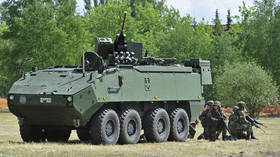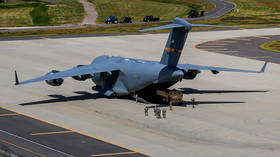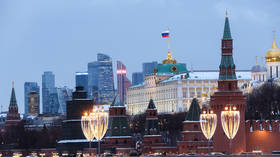Switzerland bans NATO member from sending arms to Ukraine

The Swiss government has vetoed Denmark's request to supply Ukraine with Swiss-made armored vehicles, citing its neutrality policy, broadcaster SRF reported on Wednesday.
Copenhagen planned to donate Piranha III armored personnel carriers to Ukraine for use in the conflict with Russia. The Swiss State Secretariat for Economic Affairs, however, rejected a request to send around 20 of the vehicles to Kiev.
Denmark previously committed itself not to re-export Swiss-made weapons to other countries without Bern’s approval.
While Switzerland has partially abandoned its long-standing neutrality policy in joining sanctions against Russia over the military offensive against Ukraine, Bern has said its neutrality does not permit the provision of arms for use in conflict zones.
According to the SRF report, the Swiss Federal Council may shift its stance on the issue this or next Friday, with a number of MPs saying there is some leeway in the country’s War Material Act. In their view, the legislation might allow Bern to permit other countries to re-export their weaponry to conflict zones under certain circumstances.
Some analysts disagree, however. Jean-Marc Rickli, head of Global and Emerging Risks at the Geneva Center for Security Policy, believes the government is legally justified in banning the re-export of Swiss weaponry to Ukraine. Given Switzerland's neutrality, “agreeing on the export would be a violation of international law as well as Swiss domestic law,” he said.
On the same basis, Switzerland previously vetoed the provision of Swiss-made ammunition used in German Gepard anti-aircraft tanks to Kiev.
Nonetheless, pressure on Switzerland to show flexibility on the issue has been mounting for some time. German Vice Chancellor Robert Habeck recently told the World Economic Forum that he wants “maximum support” for Ukraine.
Until recently Germany was also unwilling to supply arms to conflict zones, a stance that changed right after Moscow’s attack on Ukraine
“The Russian invasion of Ukraine marks a turning point. It threatens our entire post-war order”, German Chancellor Olaf Scholz said in late February, adding that Berlin would do its outmost to support Kiev.
At that time, Germany agreed to deliver Gepard anti-aircraft systems to Ukraine, as well as a number of PzH 2000 self-propelled howitzers.
Russia attacked Ukraine in late February, following Kiev’s failure to implement the terms of the Minsk agreements, first signed in 2014, and Moscow’s eventual recognition of the Donbass republics of Donetsk and Lugansk. The German- and French-brokered protocols were designed to give the breakaway regions special status within the Ukrainian state.
The Kremlin has since demanded that Ukraine officially declare itself a neutral country that will never join the US-led NATO military bloc. Kiev insists the Russian offensive was completely unprovoked and has denied claims it was planning to retake the two republics by force.














